Conference Cancellation Letter
[Your Name]
[Your Title]
[Your Organization]
[Address]
[City, State, ZIP Code]
[Email Address]
[Phone Number]
[Date]
[Recipient's Name]
[Recipient's Title]
[Recipient's Organization]
[Address]
[City, State, ZIP Code]
Dear [Recipient's Name],
Subject: Cancellation of [Conference Name] scheduled for [Conference Dates]
I hope this letter finds you in good health. It is with regret that I must inform you of the cancellation of the [Conference Name] that was scheduled to take place from [Conference Dates] at [Conference Venue]. This decision has been made after careful consideration and evaluation of the current circumstances.
Due to unforeseen and unavoidable circumstances beyond our control, including [briefly explain the reasons for the cancellation, such as travel restrictions, health concerns, government regulations, financial constraints, etc.], we find it necessary to cancel the conference.
We understand the impact that this cancellation may have on our participants, speakers, sponsors, and all those who were looking forward to attending the conference. Please accept our sincerest apologies for any inconvenience this may cause.
We are actively exploring alternative ways to share the valuable insights and knowledge that the conference was intended to provide. We will be in touch with registered participants and stakeholders shortly to discuss possible options, including virtual events, webinars, or rescheduling at a later date.
In the meantime, we will initiate the process of refunding the registration fees to all registered participants. Our team will be reaching out individually to provide more information on this process.
We appreciate your understanding and support during these challenging times. If you have any questions or concerns, please do not hesitate to contact our conference team at [Conference Team Email Address] or [Conference Team Phone Number].
Once again, we sincerely apologize for any inconvenience this cancellation may have caused and hope to have your continued support in our future endeavors.
Thank you for your understanding.
Sincerely,
[Your Name]
[Your Title]
[Your Organization]
Organizer to Attendees - General Conference Cancellation
Subject: Important Update: [Conference Name] Cancellation
Dear [Attendee Name],
We regret to inform you that [Conference Name], scheduled for [Date] at [Venue], has been cancelled due to unforeseen circumstances. This decision was not made lightly and comes after careful consideration of all available options.
The cancellation is due to [specific reason - health concerns, venue issues, insufficient registrations, etc.]. We understand the inconvenience this may cause and sincerely apologize for any travel arrangements or schedule adjustments you may have already made.
All registration fees will be fully refunded within 7-10 business days. You will receive a separate email confirmation once the refund has been processed. If you have any questions regarding your refund, please contact our finance team at [email/phone].
We are exploring the possibility of rescheduling this event for [timeframe] and will keep you informed of any developments. Your registration will automatically transfer to the new date unless you request otherwise.
Thank you for your understanding and continued support.
Sincerely,
[Name]
[Title]
[Organization]
[Contact Information]
Last-Minute Emergency Cancellation
Subject: URGENT: [Conference Name] Cancelled - Immediate Action Required
Dear Conference Participants,
We must immediately cancel [Conference Name] scheduled for tomorrow, [Date], due to [emergency situation - severe weather, security threat, facility emergency, etc.].
Your safety is our top priority, and this cancellation is necessary to ensure everyone's wellbeing. Please do not travel to the venue.
Immediate next steps:
- All attendees will receive full refunds within 48 hours
- Hotel reservations: Contact [hotel contact] for cancellation assistance
- Flight changes: We will provide documentation for airline change policies
- Emergency contact: [phone number] available 24/7
We will communicate rescheduling information within the next 72 hours via email and our website.
We deeply apologize for this last-minute disruption.
Emergency Response Team
[Organization Name]
[Emergency Contact Information]
Venue-Related Cancellation
Subject: [Conference Name] Venue Cancellation Notice
Dear Valued Attendees,
It is with great disappointment that we must cancel [Conference Name], originally scheduled for [Date] at [Venue Name]. The venue has experienced [specific issue - fire damage, structural problems, double booking, closure, etc.] that makes it impossible to host our event safely.
Despite our extensive efforts to secure an alternative location on short notice, we were unable to find a suitable replacement venue that meets our conference requirements and capacity needs.
Refund and compensation details:
- Full registration fee refunds will be processed within 5 business days
- Travel expense reimbursement forms will be sent separately for pre-approved cases
- Vendor and sponsor agreements will be addressed individually
We are actively working to reschedule this conference for [proposed timeframe] and will announce the new date and venue within 30 days. Your registration will automatically transfer unless you request a refund.
We appreciate your patience and understanding during this challenging situation.
Best regards,
[Name]
[Title]
[Event Management Company]
Low Registration Cancellation
Subject: [Conference Name] Cancellation Due to Registration Numbers
Dear Registered Participants,
After careful consideration, we have made the difficult decision to cancel [Conference Name] scheduled for [Date]. Unfortunately, we did not receive sufficient registrations to make the conference financially viable and deliver the high-quality experience you deserve.
We require a minimum of [number] attendees to cover speaker fees, venue costs, and provide the networking opportunities that make our conferences valuable. With current registration at [number], we cannot meet these standards.
This decision ensures we maintain our commitment to excellence rather than delivering a compromised experience. All registered attendees will receive:
- Complete refund of registration fees within 7 business days
- First priority registration for our next conference
- Exclusive access to presentation materials that were prepared
- Invitation to a virtual networking session with scheduled speakers
We sincerely appreciate your interest and support. We look forward to welcoming you to our next event.
Warm regards,
[Name]
[Conference Director]
Speaker Cancellation Impact
Subject: [Conference Name] Update - Event Cancellation
Dear Conference Attendees,
We must unfortunately cancel [Conference Name] due to the unavailability of our keynote speakers. [Key speaker names] have had to withdraw due to [reason - health issues, scheduling conflicts, travel restrictions, etc.].
These speakers were central to our conference theme and promised content. Rather than significantly alter the program or provide substitute speakers of lesser caliber, we believe cancellation better serves your interests and expectations.
Alternative arrangements:
- Virtual presentation recordings will be made available when possible
- One-on-one consultation opportunities with available speakers will be offered
- Complete refunds processed within 10 business days
- Option to attend similar conferences at partner organizations with discounted rates
We understand your disappointment and share your frustration with this outcome.
Respectfully,
[Name]
[Program Committee Chair]
Health and Safety Cancellation
Subject: [Conference Name] Cancelled - Health and Safety Priority
Dear Conference Community,
In light of current health advisories and our commitment to participant safety, we are cancelling [Conference Name] scheduled for [Date]. This decision aligns with [health authority] recommendations and our responsibility to protect all attendees, speakers, and staff.
Health considerations include:
- Current outbreak status in our region
- Venue capacity restrictions
- Travel limitations affecting international speakers
- Uncertainty regarding future health developments
Virtual alternative: We are rapidly developing a virtual conference experience for [dates] featuring most of our planned content. Registered attendees will automatically receive access at no additional charge.
Financial arrangements:
- Option 1: Full refund if you prefer not to attend virtually
- Option 2: Transfer registration to virtual format
- Option 3: Credit toward future in-person conference
Please respond by [date] with your preference.
Stay safe and healthy,
[Name]
[Health and Safety Committee]
Attendee to Organizer - Personal Cancellation
Subject: Conference Registration Cancellation Request - [Your Name]
Dear [Conference Organizer/Registration Team],
I am writing to formally cancel my registration for [Conference Name] scheduled for [Date]. My registration number is [number] and I registered under the name [full name].
Due to [brief reason - work commitments, family emergency, travel restrictions, health concerns], I will be unable to attend this conference. I understand this may be short notice and apologize for any inconvenience.
According to your cancellation policy, I believe I am eligible for [full refund/partial refund/credit]. Please process my cancellation and confirm the refund amount and timeline.
If possible, I would appreciate:
- Confirmation email of cancellation
- Access to presentation materials post-conference
- Information about future similar events
Please let me know if you need any additional information to process this request.
Thank you for your understanding.
Best regards,
[Your Name]
[Contact Information]
[Registration Details]
Sponsor Withdrawal Cancellation
Subject: [Conference Name] Cancellation Notice - Sponsor Withdrawal
Dear Registered Attendees and Stakeholders,
We regret to announce the cancellation of [Conference Name] following the withdrawal of our major sponsors. [Sponsor names] have withdrawn their support due to [budget constraints, strategic changes, company restructuring, etc.].
Without this essential funding, we cannot deliver the conference experience we promised, including:
- High-profile speaker lineup
- Premium venue and catering
- Advanced technology and equipment
- Comprehensive conference materials
Rather than compromise on quality, we have chosen to cancel and refund all participants fully.
Financial resolution:
- All registration fees refunded within 5-7 business days
- Vendor contracts terminated with appropriate compensation
- Future sponsorship discussions underway for rescheduled event
We are exploring partnerships with other organizations to potentially reschedule this conference in [timeframe]. Updates will be provided via our mailing list.
Thank you for your continued support during this transition.
Sincerely,
[Name]
[Executive Director]
What is a Conference Cancellation Letter and Why is it Necessary
A conference cancellation letter is a formal communication document that officially notifies stakeholders about the termination of a planned conference or professional gathering. These letters serve multiple critical purposes: they provide legal documentation of the cancellation, ensure transparent communication with all parties involved, demonstrate professional responsibility and accountability, and help maintain organizational credibility during challenging circumstances. The letter acts as both an informational tool and a relationship preservation mechanism, helping organizations manage the disappointment and logistical complications that arise when events cannot proceed as planned.
Who Should Send Conference Cancellation Letters
Conference cancellation letters should be sent by the highest appropriate authority within the organizing body. Event directors, conference chairs, or executive directors typically handle major organizational cancellations. For smaller events, program managers or department heads may send these communications. In corporate settings, the responsible department head or project manager should author the letter. The key is ensuring the sender has sufficient authority to make cancellation decisions and can speak authoritatively about refunds, rescheduling, and organizational policies. In cases where multiple organizations are involved, the primary organizing body should coordinate the communication, though co-organizers may need to send additional letters to their specific stakeholders.
When Conference Cancellation Letters Are Required
Conference cancellation letters become necessary in numerous scenarios including venue emergencies such as fires, structural damage, or facility closures, health and safety concerns like disease outbreaks or severe weather warnings, insufficient registration numbers that make events financially unviable, key speaker cancellations that fundamentally alter the program value, major sponsor withdrawals that eliminate essential funding, organizational financial difficulties or budget cuts, technical failures that cannot be resolved in time, legal issues or regulatory compliance problems, force majeure events including natural disasters, and security threats or safety concerns. The timing of these triggers varies, but letters should be sent immediately upon final cancellation decisions to minimize participant inconvenience and demonstrate organizational transparency.
How to Write and Send Conference Cancellation Letters
The writing process begins with gathering all relevant facts about the cancellation reason, impact, and next steps. Draft the letter using clear, professional language that acknowledges the inconvenience while explaining the necessity of cancellation. Include specific details about refunds, timelines, and alternative arrangements. Review the letter for accuracy, tone, and completeness before sending. Distribution should follow a strategic sequence: inform internal stakeholders first, then speakers and sponsors, followed by registered attendees, and finally broader marketing lists. Use multiple communication channels including email, website announcements, and social media to ensure comprehensive reach. Follow up with phone calls for high-priority stakeholders and maintain detailed records of all communications sent.
Requirements and Prerequisites Before Sending Cancellation Letters
Before sending cancellation letters, organizations must complete several critical preparatory steps. Obtain official authorization from appropriate decision-makers including board approval if required. Review all contracts with venues, speakers, sponsors, and vendors to understand cancellation clauses and financial obligations. Calculate total refund amounts and ensure sufficient funds are available for processing. Prepare alternative arrangements such as virtual options, rescheduling plans, or partner event recommendations. Coordinate with legal counsel if contractual disputes are possible. Gather complete contact lists for all stakeholders including attendees, speakers, sponsors, media contacts, and vendors. Develop a communication timeline that prioritizes stakeholder groups appropriately. Prepare responses to anticipated questions about refunds, rescheduling, and future events. Ensure customer service capacity to handle increased inquiry volume following the announcement.
Formatting Guidelines and Best Practices
Conference cancellation letters should maintain professional formatting with clear subject lines that immediately convey the cancellation news. Use business letter format for formal communications and email format for digital distribution. Keep the tone professional, apologetic, and solution-oriented while avoiding overly emotional language. Include specific dates, times, and reference numbers for easy tracking. Structure the letter with an immediate cancellation statement, clear explanation of reasons, detailed next steps including refund processes, and contact information for questions. Avoid lengthy explanations that may seem like excuses while providing sufficient context for understanding. Use bullet points for complex information like refund procedures or alternative arrangements. Maintain consistent branding and professional appearance even during crisis communications. Ensure the letter is scannable with clear headings and white space for easy reading.
Follow-up Actions After Sending Cancellation Letters
After sending cancellation letters, organizations must execute several follow-up activities. Process refunds according to stated timelines and send confirmation emails for each transaction. Monitor and respond promptly to stakeholder inquiries through phone, email, and social media channels. Update websites and marketing materials to reflect cancellation status. Coordinate with vendors for contract terminations and final payments. Begin planning for potential rescheduling including venue availability and speaker coordination. Conduct stakeholder relationship management to preserve future participation. Document lessons learned and update emergency procedures based on the experience. Provide regular updates to stakeholders about rescheduling progress or alternative opportunities. Maintain detailed records of all post-cancellation activities for accounting and legal purposes. Consider sending thank-you communications to stakeholders who demonstrated understanding and flexibility during the cancellation process.
Advantages and Disadvantages of Conference Cancellation
Cancelling conferences offers several advantages including protection of organizational reputation by avoiding substandard events, financial risk mitigation when losses would be substantial, demonstration of responsible decision-making during crises, and preservation of stakeholder safety and wellbeing. Cancellation also allows for proper rescheduling when conditions improve and prevents damage to sponsor and speaker relationships that might occur from poor event execution. However, disadvantages include immediate financial losses from non-refundable expenses, damage to organizational credibility and future event attendance, lost networking and learning opportunities for participants, negative impact on industry relationships and partnerships, and potential legal complications from contract breaches. The decision requires careful weighing of short-term losses against long-term organizational health and stakeholder relationships.
Common Mistakes to Avoid in Conference Cancellation Communications
Frequent mistakes in conference cancellation communications include delaying notification until the last possible moment, failing to provide clear refund procedures and timelines, offering insufficient explanation for cancellation reasons, forgetting to address specific stakeholder groups like sponsors or media, using defensive or blame-shifting language in explanations, providing inconsistent information across different communication channels, neglecting to offer alternatives or future opportunities, inadequate preparation for handling stakeholder questions and complaints, sending generic letters that ignore individual stakeholder investments, and failing to coordinate internal messaging before external communications. Organizations also commonly underestimate the customer service resources needed post-cancellation and fail to maintain professional tone when facing criticism. Avoiding these mistakes requires careful planning, clear communication strategies, and comprehensive stakeholder consideration throughout the cancellation process.

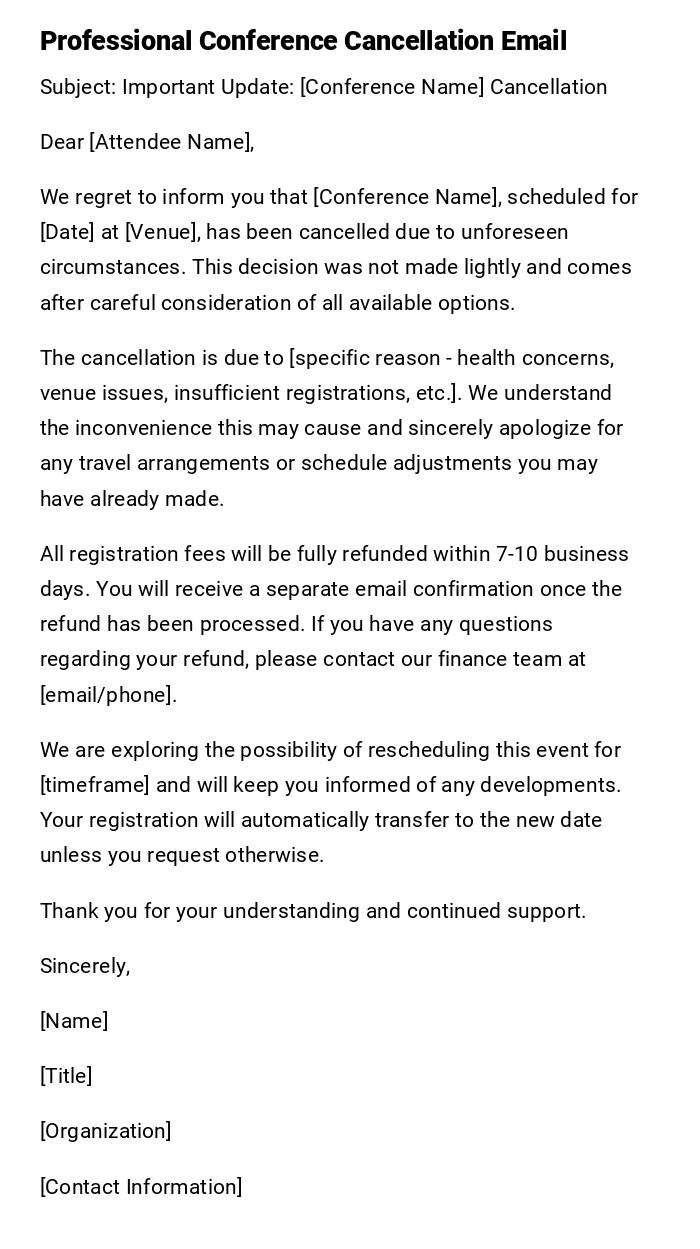
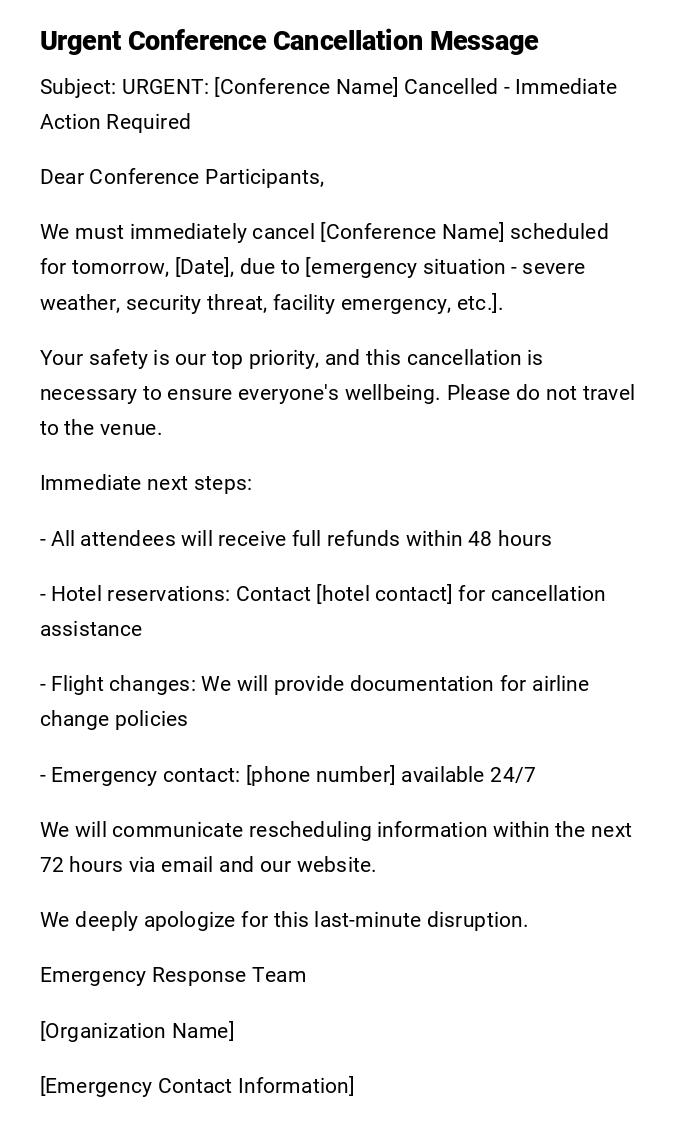
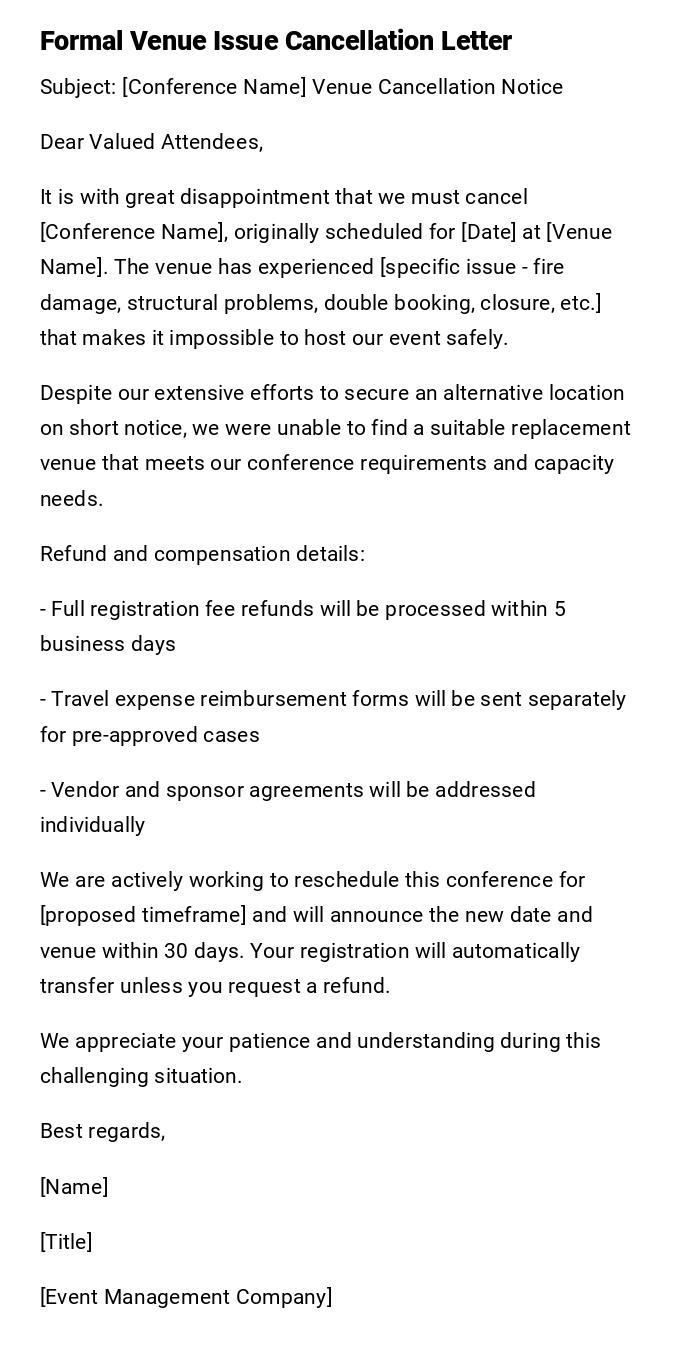
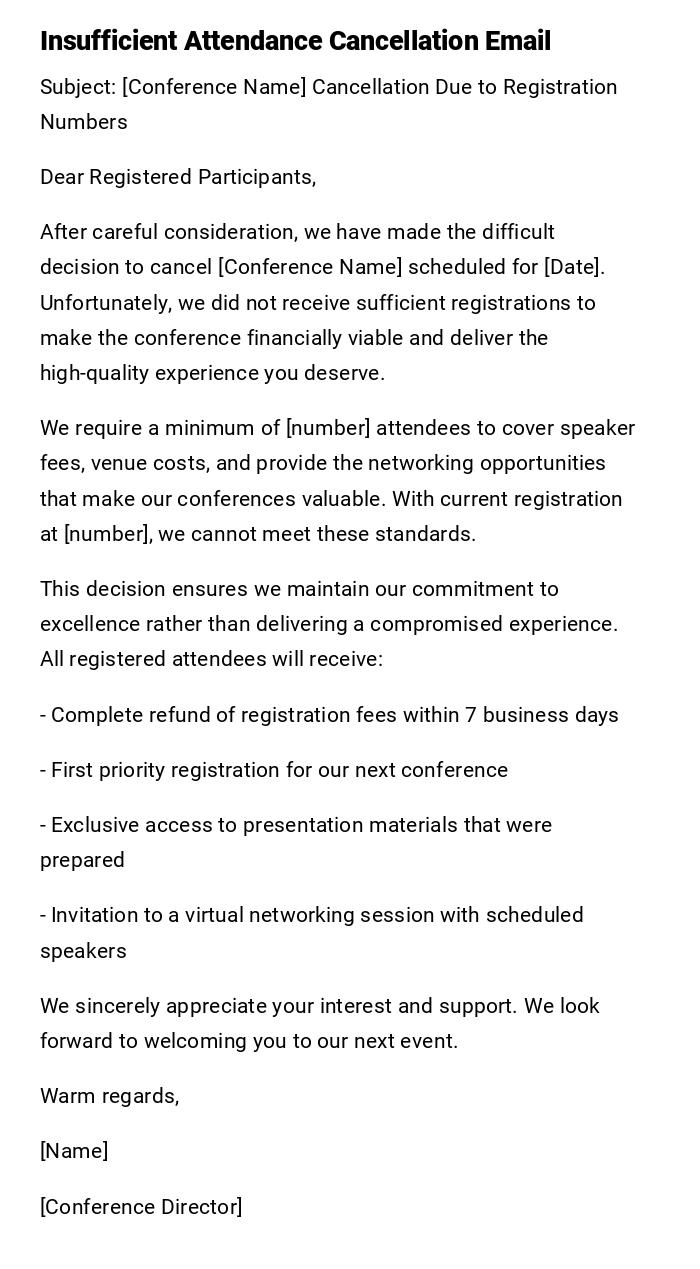
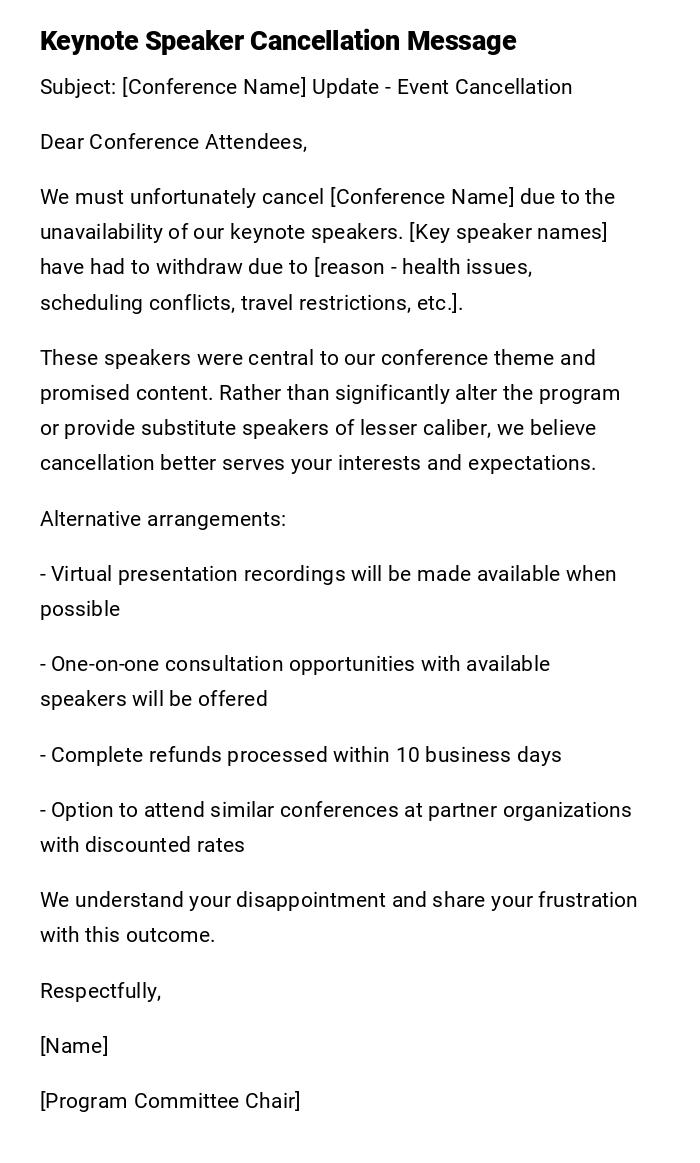
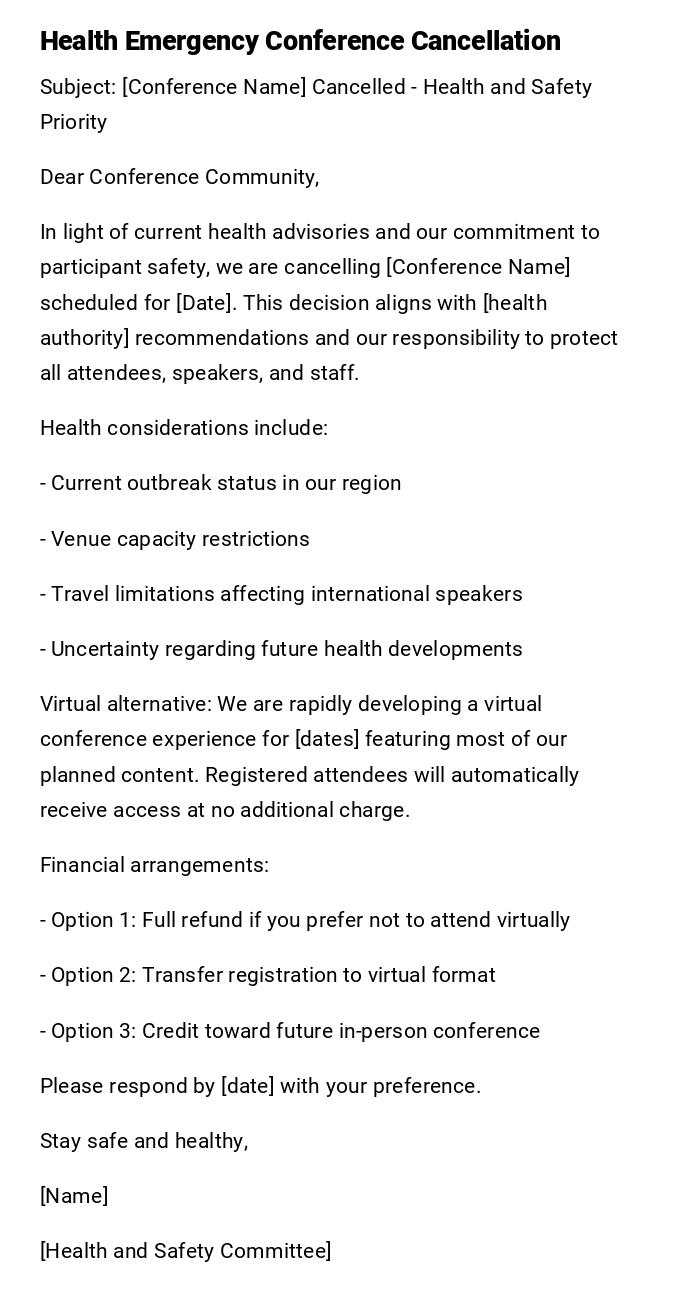
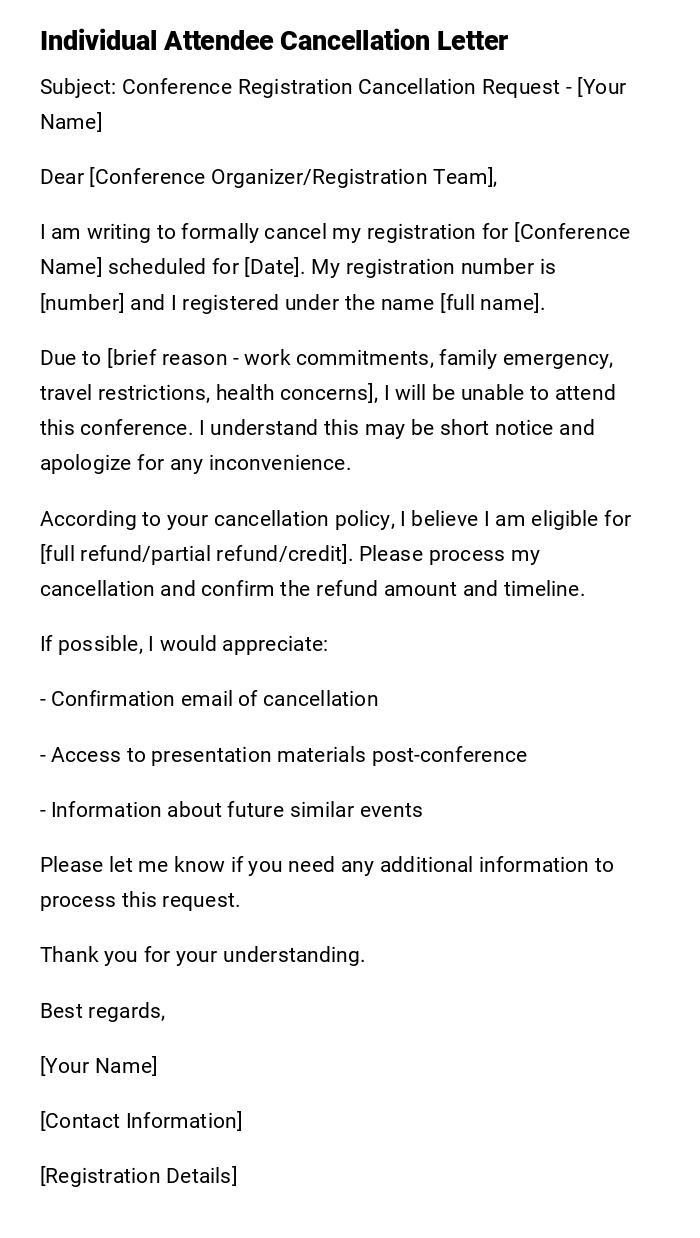
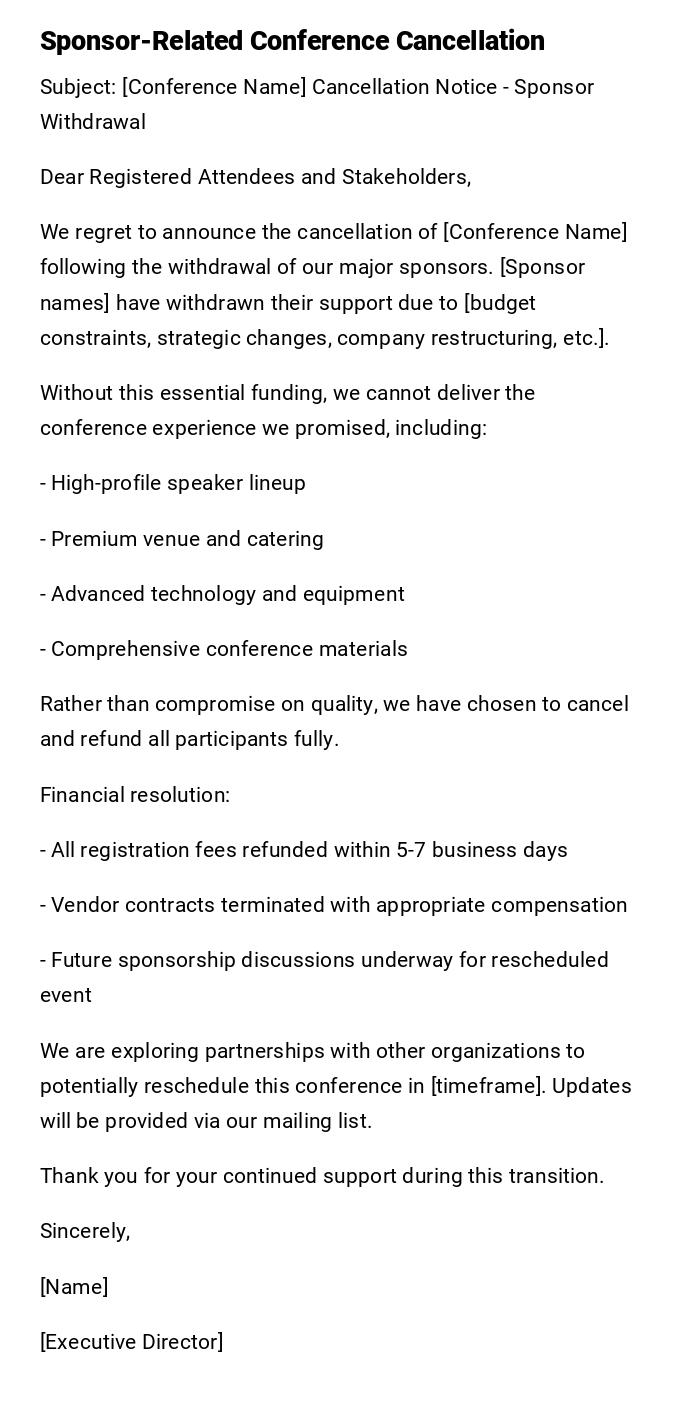

 Download Word Doc
Download Word Doc
 Download PDF
Download PDF